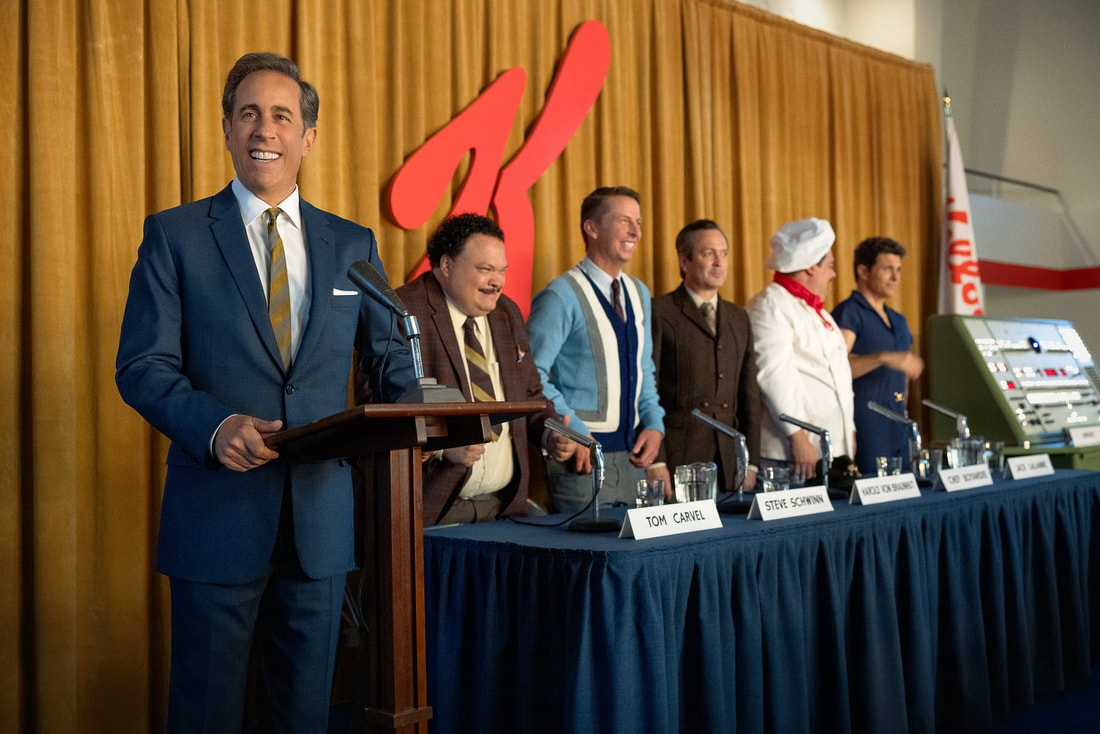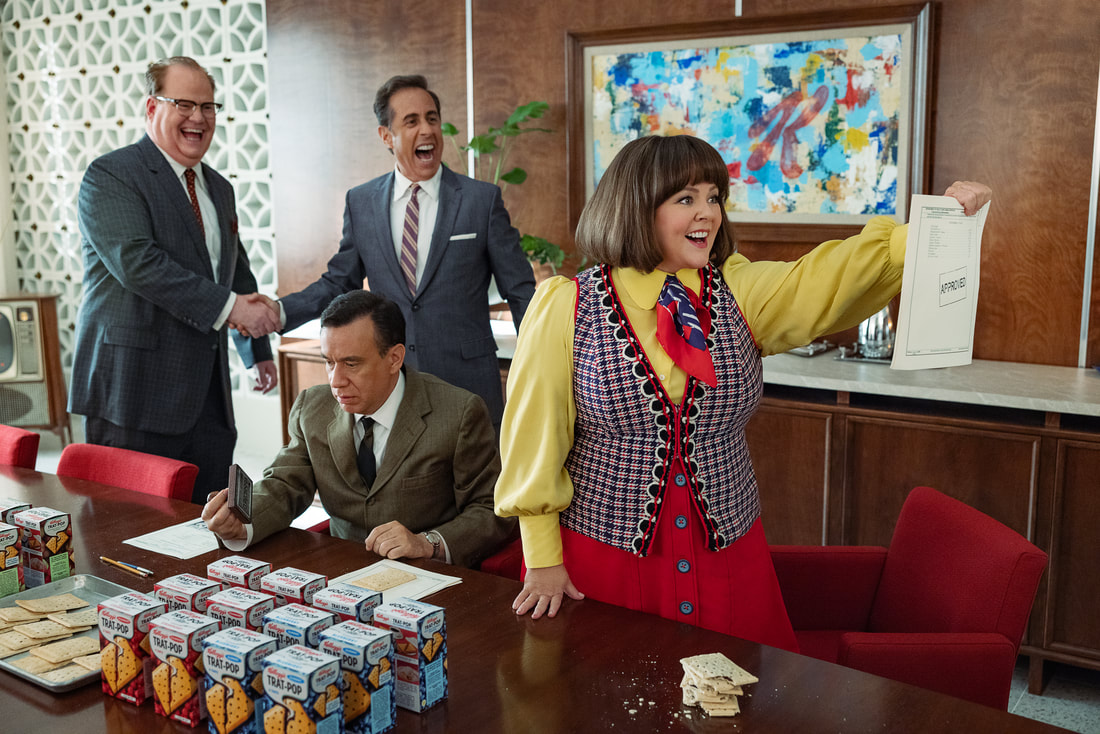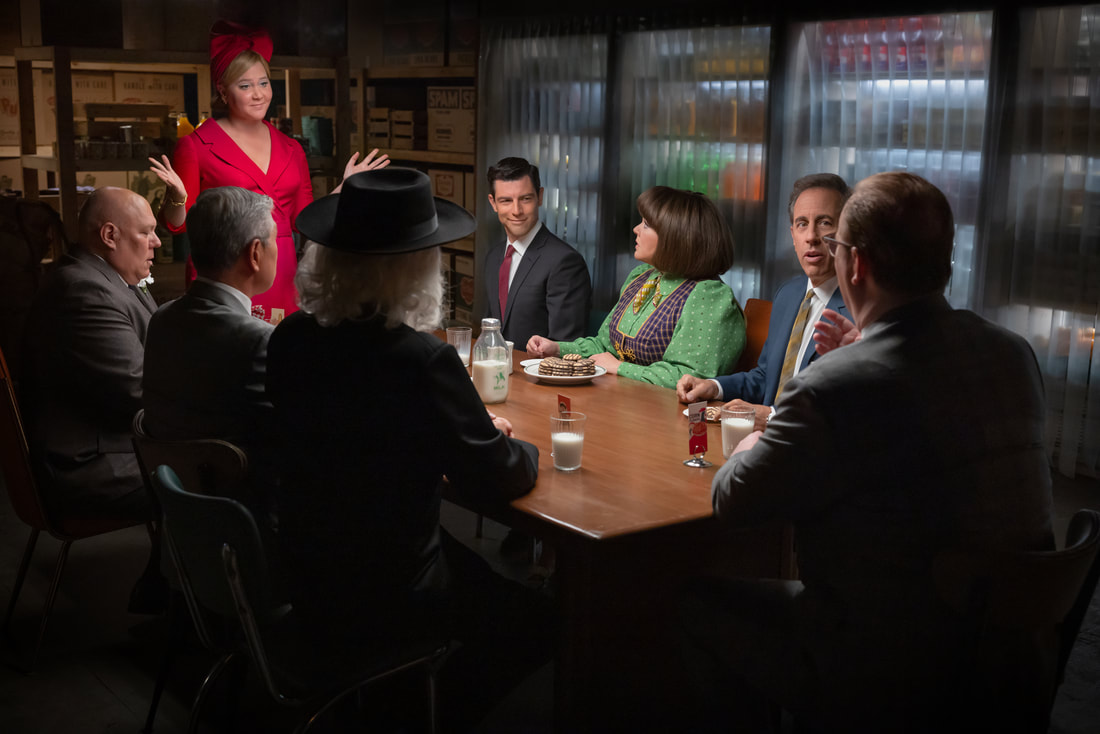|
Review by Daniel Lima “You can’t do comedy anymore because of woke” is a conviction that comedian Jerry Seinfeld has proclaimed for years now. In spite of his own squeaky-clean material, he firmly believes that comedy is an art and craft that should be separated from the world around it, offering no political perspective, social commentary, or even insight into the artist’s personality or worldview. It’s no surprise, then, that his feature directorial debut Unfrosted is so detached from reality that it’s impossible to see what exactly animated him to spearhead the project. What might be surprising is how poisonously, dangerously unfunny it is. The film is the newest entry in the current infernal trend of corporate IP cinema, movies about the invention of specific consumer products. The product in question here is the Pop-Tart, produced by Kellogg’s in the 1960s. Unlike previous examples that insist on the earth-shattering importance of a pair of basketball shoes or a children’s video game, Seinfeld recognizes that there is nothing special about a breakfast pastry. Instead, the film is a broad, absurdist take on this kind of film: colorful and ornate ‘60s sets and costumes, a vast array of goofy characters played by a murderer’s row of comedians and celebrities, and a dense aura of self-parody and irony. On paper, this is the best possible way to approach the material. Seinfeld’s observation brand of comedy has always been laser-focused on pointing out the absurdity of everyday mundanity (something he has only a tenuous grasp of, given his ultra-rich lifestyle), and a silly movie about a sugary breakfast food seems perfect fodder. There’s plenty of humor to be mined, either by parodying the self-serious version of this kind of film or simply using the skeleton of the familiar narrative structure to allow for every gag the artist can think of. Unfortunately, it becomes immediately apparent that the seventy-year-old man who insists that comedy is an unchanging entity separate from worldly concerns has an incredibly limited imagination. The one-liners are all tired, hack material that recalls Seinfeld’s own stand-up, a relic even forty years ago: “Who’s On First?” style riffs, playground humor about the names of different cereals, and only the most basic pop culture references. The genuinely impressive production design is undermined by high key lighting that gives everything a cheap look, and the scant attempts at visual humor are just as lame and tired. Most egregious is the utter lack of comic rhythm and timing, either stifling the jokes or leaving them to die on the vine. All this is in service to the one big joke underpinning every moment of Unfrosted: “Isn’t it stupid to make a movie like this?” This kind of anti-comedy isn’t inherently bad, with both alt-comics and more mainstream comedians utilizing offbeat timing and hackneyed material to great ironic effect. Where Seinfeld goes wrong is he has nowhere to go except to point out how dumb the enterprise is. This isn’t an explicit parody of the current IP movie trend; there’s a lack of the cartoonishly broad ingenuity of Zucker-Abrahams-Zucker, and the specificity of a Coen Brothers farce is absent. The ensemble is good, but they can only do so much with finger-on-the-pulse jokes about JFK having extramarital affairs (with the exception of Hugh Grant, who shines). Ultimately, the only thing the film has to offer is the acknowledgment that it isn’t good. Which, paradoxically, reveals that Seinfeld truly thinks that this is enough to pass muster with a contemporary audience. The result is a work that is both absurdly self-assured and woefully undercooked. As resistant as the man is to comedy that professes a set of beliefs or directly contends with the comic’s inner self, it’s the fleeting moments of Unfrosted where Seinfeld’s own reactionary impulses shine through that it shows any signs of life. Offhand jokes at the expense of the working class, unions, and socialism manage to sneak through his studiously calculated apolitical veneer in keeping with his frequent criticism of the American left and political correctness. This ambient ideology is never given any weight. Still, when a worker’s strike turns into a Jan. 6-style assault on Kellogg’s headquarters, it doesn’t take much to read between the lines: to Seinfeld, low-wage workers asking for a raise and right-wing extremists storming the Capital are equally silly. As disagreeable as this outlook might be, it does give the film a verve that it otherwise lacks.
Seinfeld's central misunderstanding of art is that it is not a mere mechanism. To him, comedy is a feat of engineering, taking the raw materials that the lives we lead afford us and molding them into something that provokes a certain response; any message or statement is simply a byproduct of that process. While craft is certainly important, art is, in fact, a form of self-expression and communication, and the ideal artist actually has something to say, either about the world or themselves. Cultivating a singular voice and perspective is what marks a true artist and, in the case of comedy, what separates the truly funny from the hacks. This is why Unfrosted is a failure. For all the work done to bring this vision to life, it is shockingly hollow and devoid of any sense of purpose. Even if it were a technically accomplished film that got all the fundamentals right, it would be every bit as soulless and out of touch as the man behind it. It just so happens that it’s also not funny. Unfrosted releases on Netflix May 3. Rating: 1.5/5
0 Comments
Leave a Reply. |
Archives
July 2024
Authors
All
|
|
|
disappointment media
Dedicated to unique and diverse perspectives on cinema! |



